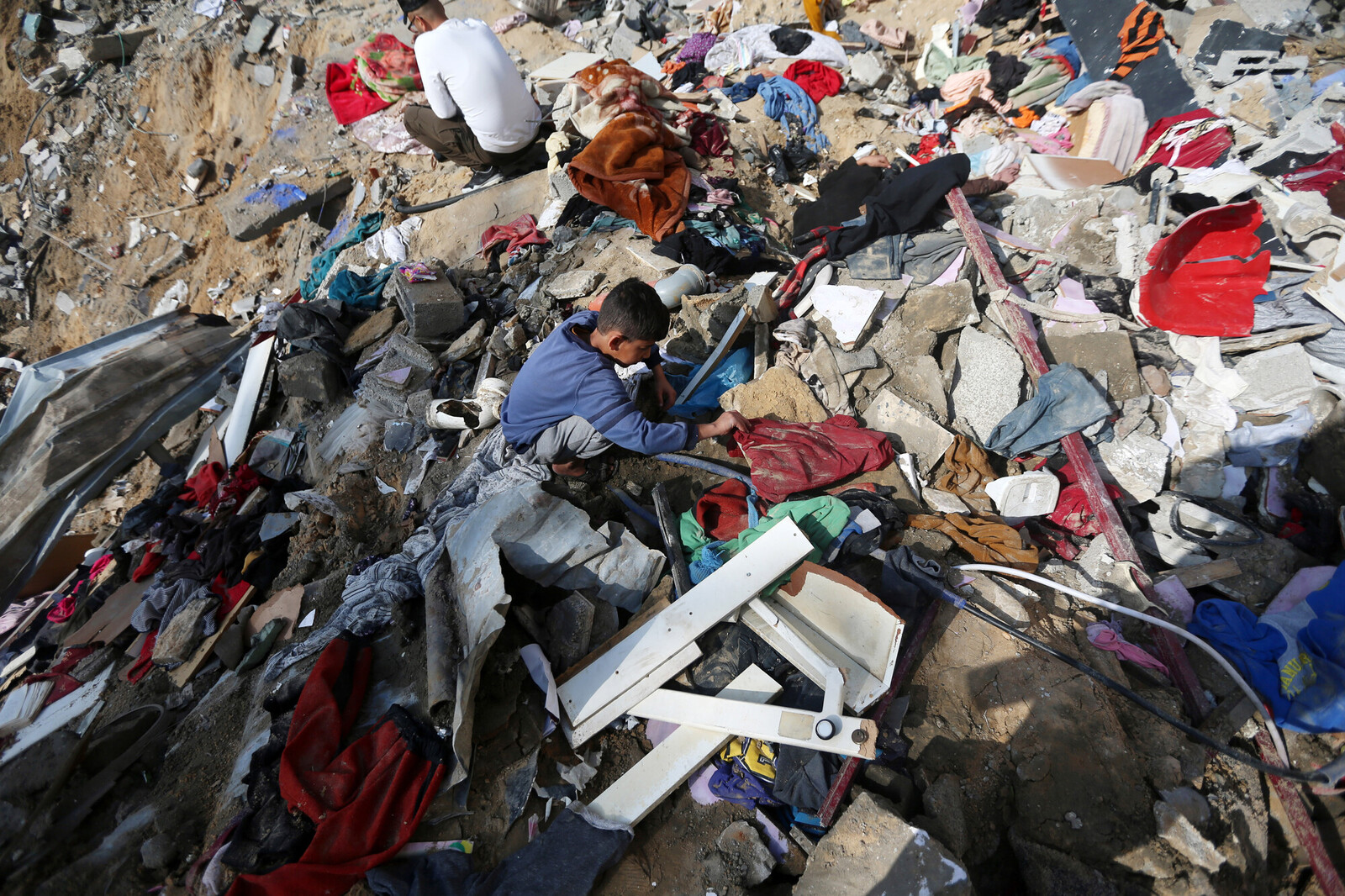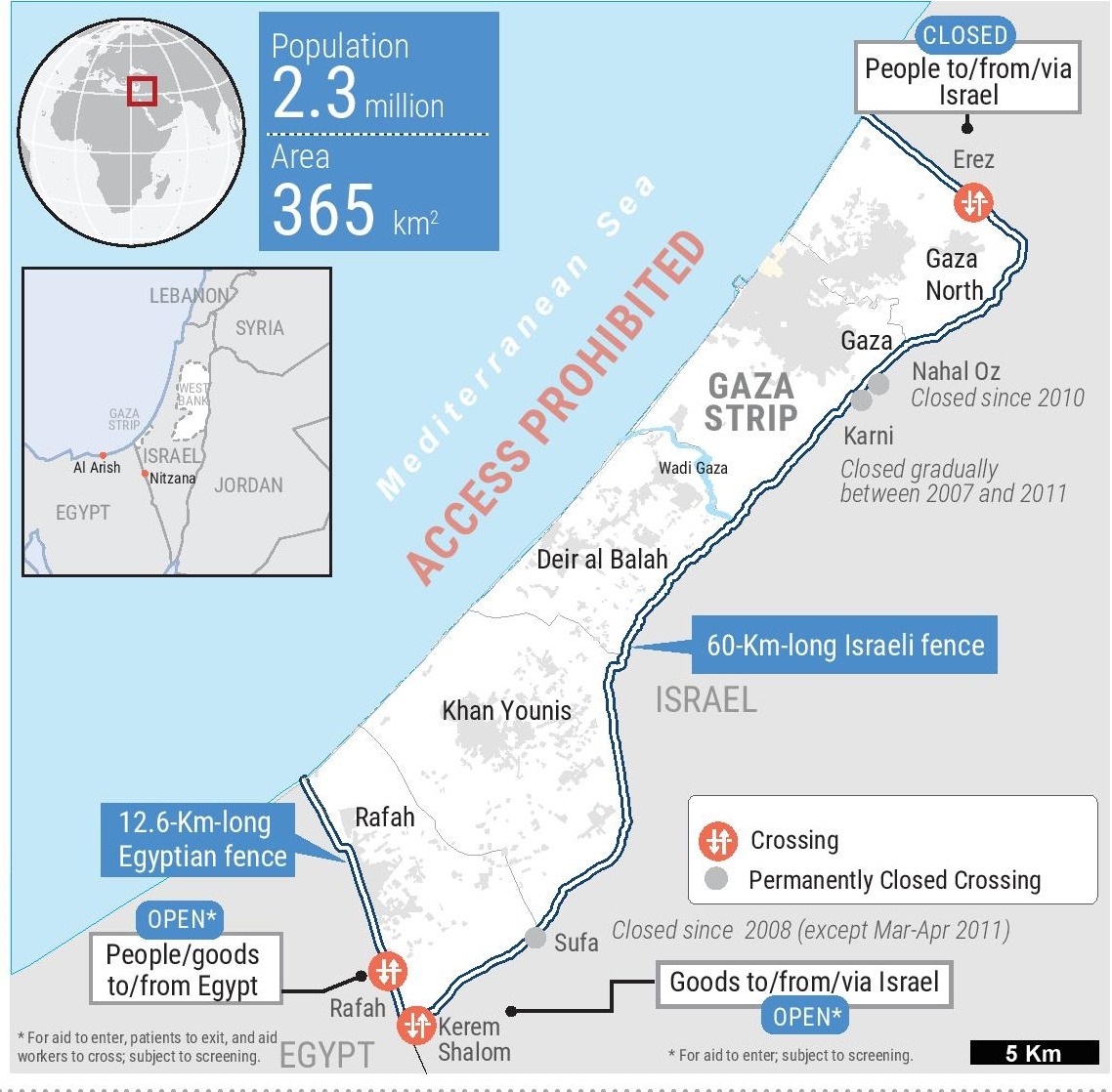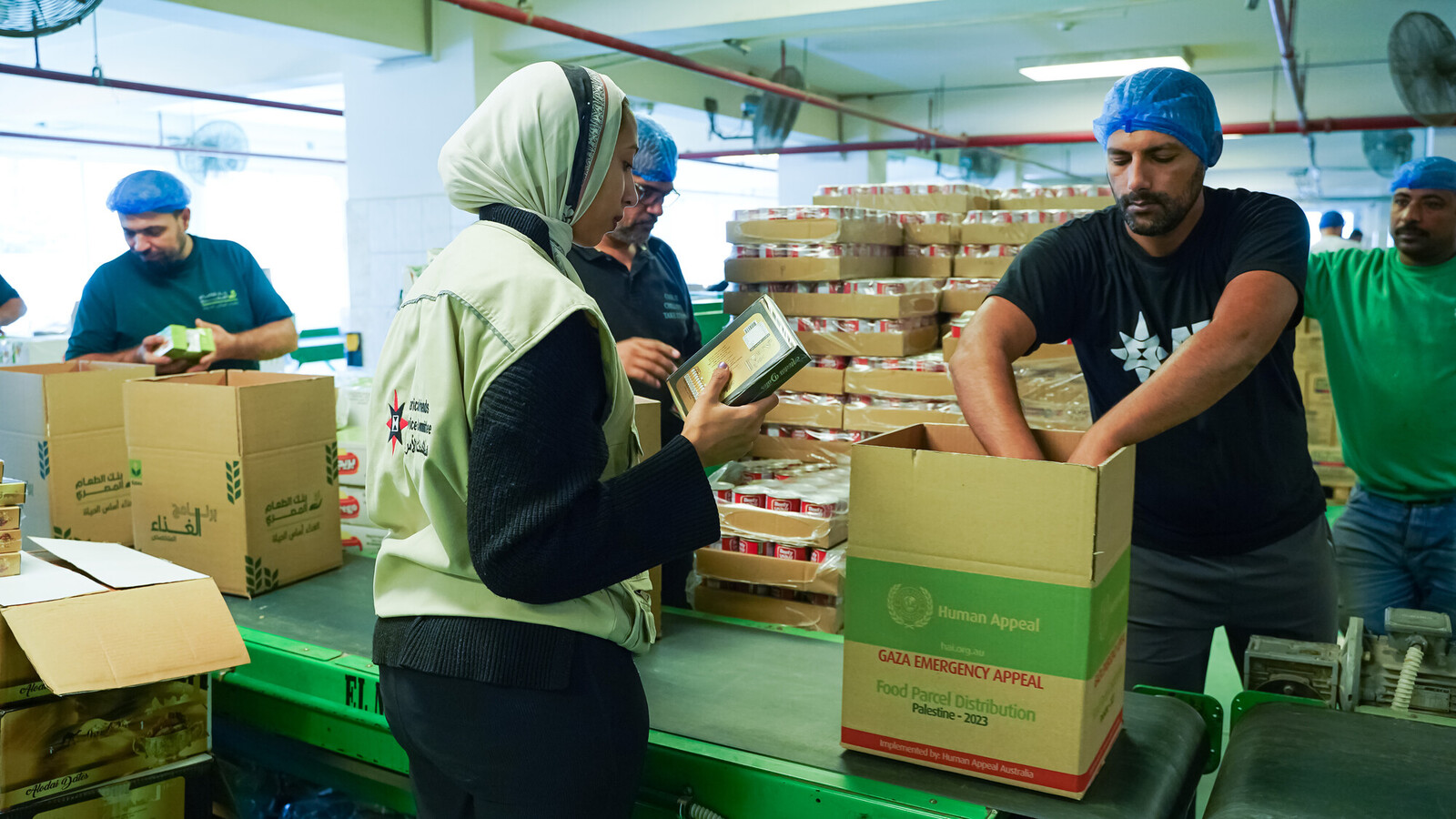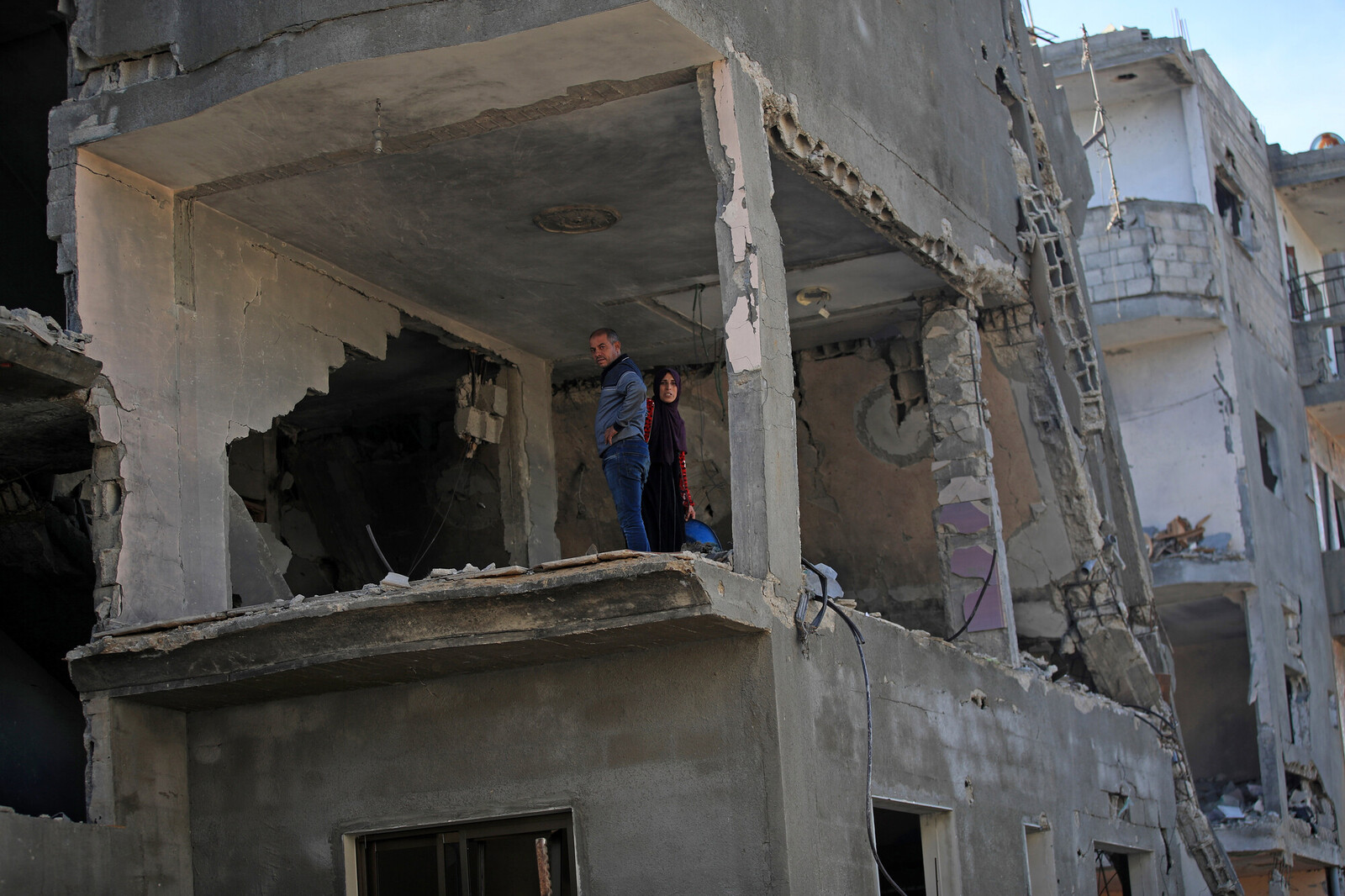
A child picks through rubble in Gaza. Mohammed Zaanoun
AFSC has offices and staff in Jerusalem, Gaza, the West Bank, and Jordan. Today, we are providing humanitarian relief to Palestinians in Gaza and the West Bank—as we advocate for a permanent cease-fire and protection for the Palestinian people.
Here’s the latest from our Middle East team on the situation facing Palestinians and how AFSC is responding to the crisis.
By the numbers: The human toll since Oct. 7
GAZA
• 25,700+ killed (70% women and children)
• 10,000+ buried under the rubble
• 63,740 injured
• 2 million displaced
• 6,000+ arrested
• 70% of homes and other structures partially or completely destroyed
WEST BANK
• 370+ killed
• 4,353 injured
• 2,549 displaced
• 6,000+ arrested
• 445 homes and other structures partially or completely destroyed

Credit: UN OCHA
After 110 days of Israeli aggression over the Gaza Strip, the situation is catastrophic and continues to worsen exponentially in a context where needs were already dire prior to the current escalation. The situation in Gaza is catastrophic and continues to worsen exponentially. The total population of Gaza—2.3 million Palestinians—is in urgent need of help. About 250 people are killed daily and most of the population have been forcibly displaced multiple times.
The Israeli government is now using starvation as a weapon of war. The intentional destruction of health facilities—and obstructing access to them—is an increasingly common tactic being used equally in Gaza and the West Bank. The indiscriminate killing, bombardments, and the targeting and destruction of civilian protected areas and personnel have become the norm—all calculated to bring about the physical destruction of Gaza, serious bodily and mental harm, and an overwhelming human loss that has never been registered in any conflict in history at such speed.
Over the past three days, attacks on civilian sites are particularly intense in and around Khan Younis, causing mass casualties and damage and destruction of civilian infrastructure. People are trapped in shelters and hospitals in the city of Khan Younis, where thousands of displaced people are taking shelter.
More forced displacement and high risk of ethnic cleansing: On Jan. 24, the U.N. Human Rights Office in the Occupied Palestinian Territory reported that thousands of civilians were forced to flee to Rafah. “The IDF continues to shell areas that it has unilaterally designated as ‘safe’ for evacuation, reinforcing that nowhere in Gaza is safe (for example, the Al Mawasi area in western Khan Younis) and raises grave alarm of further escalation of the hostilities in Rafah which could have serious implications […] with the attendant risk that people who are essentially trapped in smaller and smaller areas may be forced out of Gaza.”
The displaced population is concentrated in the south, which is receiving new waves of people forcibly displaced from the Middle Area and Khan Younis. After Rafah, there is nowhere to escape to except the sea or crossing the border toward Egypt.
Severe overcrowding: It is estimated that over 1.5 million internally displaced people are in Rafah alone, squeezed into an extremely overcrowded space. People are sleeping in the streets, out in the open. Due to the extreme overcrowding in Rafah city, the roads are so congested that trucks cannot operate, further hampering efforts to distribute humanitarian aid.
The severe overcrowding—together with the impeded access to health and medical supplies, the lack of food and clean water, and poor living conditions—have increased the risk of deaths to many.
Hunger and starvation as a weapon of war: People are starving to death. The U.N. special rapporteur on the right to food, Michael Fakhri, stated, “Israel is destroying Gaza's food system. … We have never seen 2.3 million civilians made to go hungry within weeks. It's unprecedented to make an entire civilian population go hungry this completely and quickly.”
The risk of famine increases each day as the current conflict continues and restricted humanitarian access persists. The Famine Review Committee (FRC) stated that it is imperative to halt the deterioration of health, nutrition, food security, and mortality situation through the restoration of health, water, sanitation, and hygiene services. In addition, the FRC has called for the cessation of hostilities and the restoration of humanitarian space for delivering assistance, noting these were vital first steps to eliminate any risk of famine.
Despite 2.3 million people urgently needing food assistance each day, the average daily assistance in the last week of December reached only between 6%-8% of the people in need.
Obstructing access to health as another form of genocidal intent: On Jan. 9, the International Committee of the Red Cross (ICRC) head of Gaza sub-delegation stated that: “For three months, we have witnessed medical facilities, healthcare workers, vehicles, and first responders face relentless insecurity due to the conflict. No part of the medical system has been untouched by this war—from the killing and detention of medical professionals to the lack of essential equipment and supplies, the impact of ongoing hostilities has contributed to the total shutdown of most hospitals in Gaza.”
There are now 14 partially functional hospitals; seven in the north and seven in the south. In addition, two hospitals are providing minimal services only for those within the compounds, according to the World Health Organization (WHO) on Jan. 24. The two minimally functioning ones, Al Kheir (which the Israeli military is currently present) and Nasser (surrounded by heavy fighting), are not able to receive patients or supplies. The Palestinian Red Crescent Society has had to ask displaced people to donate blood as they are unable to access blood banks.
The WHO has registered at least 318 attacks on health facilities in Gaza and 358 in the West Bank. At least 337 , 337 health workers and more than 160 humanitarian workers have been killed in Gaza, including 152 U.N. aid workers, the biggest number registered in the U.N. history.
“The health sector in Gaza is being slowly choked off as hospitals continue to come under fire,” said the U.N. under-secretary-general for humanitarian affairs and emergency relief coordinator. “And what happens when the health system collapses? Pregnant mothers can’t deliver their babies safely. Children can’t get vaccines. The sick and wounded can’t get treatment. People die. This war needs to end.”
Lack of humanitarian access: Although there are now two corridors (Egyptian and Jordanian) and two crossings open for humanitarian aid, the increased limitations and a more exhaustive scanning by Israeli authorities have actually reduced the number of trucks entering daily.
We need unconditional humanitarian access to Gaza now. Today, there is just a fraction of the needed food supplies coming in.
Rising public health concerns: The lack of medical supplies, clean water, food, and other essential supplies—combined with poor living conditions, severe overcrowding in shelters, and the disruption of health, water, and sanitation systems—have increased the risk of communicable diseases. There are grave concerns over waterborne diseases due to water consumption from unsafe sources. Diarrhea and respiratory conditions are alarming. And there are also rising cases of influenza, chicken pox, meningitis, jaundice, impetigo acute respiratory infections, skin infections, and hygiene-related conditions like lice.
By Dec. 12, the Ministry of Health had documented 360,000 cases of infectious diseases in shelters, noting that the actual number is believed to be higher. It has also identified 14 diseases with epidemic potential and fears an outbreak due to the huge shortage of medicines and vaccinations to mitigate infectious diseases.
Vulnerable groups in difficult conditions: Several groups are especially vulnerable due to the lack of proper shelter, health and basic services. That includes people with disabilities; women who are pregnant, have recently given birth, or are breastfeeding; people who are recovering from injuries or surgeries; seniors; children, especially newborns; and those with compromised immune systems.
About 183 women deliver daily, most in tents and other challenging conditions. That, together with severe malnutrition, can lead to the death of the mother and/or the baby. Malnutrition among children and pregnant and breastfeeding women (PBW) remains a significant concern, amid lack of functioning health and sanitation systems and increasing food insecurity. Chronic malnutrition for children who do survive will result in weaker immune systems, putting them at greater risk for infections and long-term physical, mental, and cognitive consequences.
Education denied: For over three months, over 625,000 students and 22,564 teachers have been deprived of education and a safe place. Thousands of learners and education personnel are among the more than 25,000 people who have reportedly been killed. All UNRWA schools in the Gaza Strip have closed–most turned into shelters– depriving the 300,000 children who attended them of their education.

In Cairo, AFSC staff and partners pack boxes of emergency food to deliver to displaced people in Gaza. Maryam Azzam
AFSC’s emergency relief efforts
In Gaza, AFSC has provided emergency relief to displaced people in the Khan Younis and Rafah regions of Gaza, reaching 94,430 people.
Our staff, working with partners, have also provided:
- Food for 26,734 people. This includes hot meals, food parcels, and fresh vegetables.
- Drinking water for 62,406 people.
- Hygiene kits for 1,850 women and girls and 200 seniors. This includes soap, toothbrushes, toothpaste, women's hygiene products, and other supplies.
- Recreational activities for 3,420 children.
We are also sending additional aid through Egypt into Gaza when Israeli authorities allow it. So far, we have procured two trucks of food and one truck of medicine. Now we’re procuring three more trucks with blankets and winter clothes for families.
Read more about AFSC’s emergency relief.
In the West Bank, Palestinians are increasingly facing arbitrary killings and detentions, home demolitions, daily Israeli army raids, and other human rights violations. Those released from detention have reported the violations committed against detainees inside Israeli prisons, including systematic torture and abuse and the forcible disappearance of Gazan detainees. Since the aggression began, the Israeli authorities have amended military orders and laws to facilitate the prolonged detention of Palestinians without due legal process. The International Committee of the Red Cross and lawyers are being denied visits to detainees from Gaza.
Over 150,000 workers from the West Bank, previously employed in Israel and settlements, have lost their jobs due to firing or restricted crossings.
AFSC has supported 168 patients from Gaza and their relatives who were receiving treatment in Jerusalem and were forced to relocate to Ramallah during the war. We assisted patients with medical needs and winterization items. Working with partners, we are now providing patients and their families hot meals daily.
How you can help
Contact Congress today: Urge your representatives to call for a total cease-fire and humanitarian access to Gaza.
Give to AFSC’s Gaza emergency response: Your donation will bring humanitarian relief and support ongoing efforts to stop the violence, address its root causes, and build conditions for peace.
